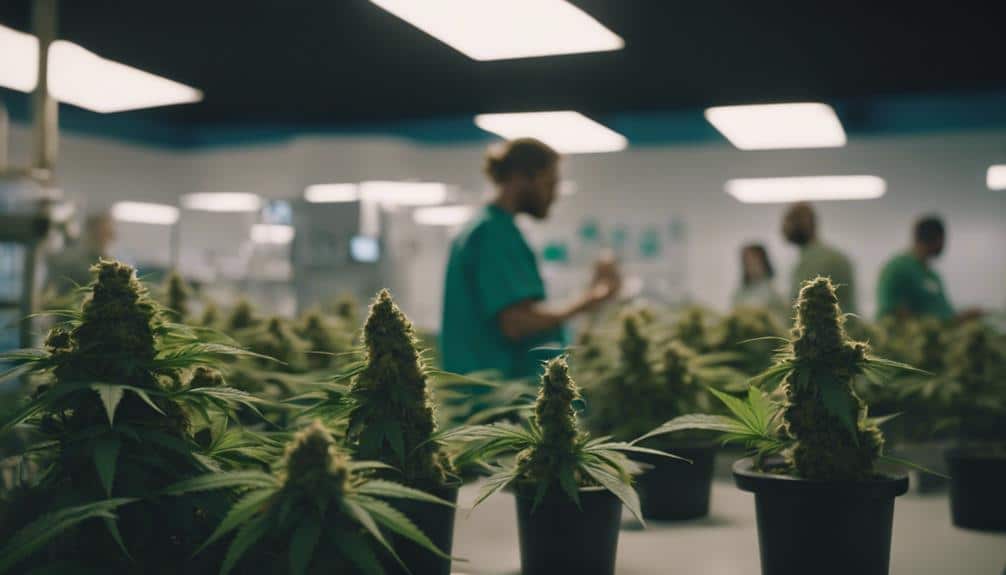Delaware’s Medical Marijuana Program is revolutionizing the landscape for chronic pain sufferers. By providing legal access to cannabis through a structured application process, patients are finding relief in ways traditional medicine often fails to deliver. This initiative not only aims to reduce opioid dependence but also enhances quality of life through personalized care. But what exactly does this program entail, and what are the real benefits and challenges faced by patients and healthcare providers? Let’s delve into the details and discover what makes Delaware’s approach unique.
Table of Contents
Delaware’s Medical Marijuana Program

The Delaware Medical Marijuana Program allows qualifying patients to legally obtain and use cannabis for chronic pain management. If you’re considering this option, it’s crucial to understand the enrollment process and the necessary qualifying conditions. The program is designed to ensure that patients who genuinely need marijuana for medical reasons can access it in a controlled and safe manner.
To enroll in the program, you must first verify that you have one of the qualifying conditions listed by the state. Chronic pain is a primary qualifying condition, but others include severe nausea, epilepsy, and multiple sclerosis. Your healthcare provider will need to certify that you have one of these conditions and that traditional treatments haven’t been effective for you.
Once certified, you’ll need to complete an application through the Delaware Department of Health and Social Services. The application process includes submitting medical records, a form of identification, and a fee. Once approved, you’ll receive a medical marijuana card, allowing you to purchase cannabis from state-licensed dispensaries.
This program aims to enhance the quality of life for patients suffering from chronic pain by providing a legal and regulated pathway to access medical marijuana.
Chronic Pain and Its Challenges
Managing chronic pain presents numerous challenges, both for patients and healthcare providers. Chronic pain often persists for months or even years, affecting your daily life and overall well-being. Traditional pain management strategies usually involve medications, physical therapy, and sometimes surgical interventions. However, these methods don’t always deliver consistent relief and can come with significant side effects.
One of the biggest hurdles in pain management is the reliance on opioid medications. While effective, opioids carry the risk of addiction and other severe side effects. As a result, finding opioid alternatives has become a priority in the medical community. This search aims to offer you relief without the associated risks of opioid use.
Healthcare providers face the challenge of balancing effective pain relief with minimizing potential harm. They must also navigate a patient’s unique medical history and treatment responses. Evidence-based approaches are essential to ensure that any new treatment, including opioid alternatives, is safe and effective. By focusing on comprehensive pain management plans, healthcare providers can better address the multifaceted nature of chronic pain.
Understanding these challenges is vital for anyone involved in healthcare as it underscores the need for ongoing innovation and patient-centered care.
Benefits of Medical Marijuana

Medical marijuana offers a promising alternative for chronic pain relief, reducing reliance on opioids and minimizing associated risks. Researchers have found that marijuana can provide significant symptom relief for various chronic pain conditions. Many patients report decreased pain levels, improved sleep, and enhanced overall quality of life.
The active compounds in marijuana, particularly THC and CBD, interact with the body’s endocannabinoid system, helping to regulate pain signals. This mechanism provides a viable option for those seeking alternative therapies to manage their pain. Unlike opioids, which carry a high risk of addiction and overdose, medical marijuana presents a safer profile for long-term use.
It’s also worth noting that medical marijuana can address multiple symptoms simultaneously. For instance, it can alleviate both pain and inflammation, making it a comprehensive solution for patients with chronic conditions. Additionally, the variety of consumption methods—from oils and edibles to vaporizers—allows for personalized treatment plans tailored to individual needs.
Exploring medical marijuana as part of a broader treatment strategy can contribute to more effective pain management and overall patient well-being. By considering this alternative, you’re supporting a movement towards safer, more holistic healthcare options.
Patient Success Stories
Many patients have experienced notable improvements in their quality of life through the use of medical marijuana for chronic pain management. Personal testimonials from patients in Delaware highlight the effectiveness of this treatment option. For instance, one patient named Sarah shared how medical marijuana provided symptom relief from her debilitating arthritis allowing her to engage in daily activities that were once impossible.
Another patient named Tom who suffers from chronic back pain reported that medical marijuana reduced his pain levels significantly enabling him to reduce his dependence on prescription opioids. These accounts aren’t isolated; many patients have consistently reported similar outcomes underscoring the potential benefits of medical marijuana in managing chronic pain.
Moreover, these personal testimonials are supported by emerging research that suggests medical marijuana can offer substantial symptom relief for various chronic conditions. Patients often describe not only a reduction in pain but also improvements in overall well-being and mental health.
Doctor and Patient Collaboration

Effective management of chronic pain with medical marijuana often hinges on close collaboration between doctors and patients to tailor treatment plans to individual needs. This partnership is essential for optimizing therapeutic outcomes and enhancing quality of life.
As a healthcare provider, you play a pivotal role in educating patients about medical marijuana and its potential benefits and risks. Clear communication is important. You should discuss the following aspects with your patients:
- Treatment goals: Establish what the patient hopes to achieve with medical marijuana.
- Dosing and administration: Explain various methods of administration and appropriate dosages.
- Monitoring and follow-up: Regularly assess the effectiveness and side effects of the treatment.
- Adjustments to the plan: Be prepared to modify the treatment plan based on the patient’s response.
- Patient education: Provide detailed information on safe use and potential interactions with other medications.
Legal Framework and Regulations
To ensure compliance with regulations surrounding medical marijuana, both patients and healthcare providers must understand the legal framework. In Delaware, the Delaware Medical Marijuana Act (DMMA) sets the standards for medical marijuana use, including criteria for qualifying conditions like chronic pain. Knowing these guidelines ensures that you can responsibly advocate for your patients while adhering to state laws.
It’s important to stay updated on regulatory updates issued by the Delaware Department of Health and Social Services (DHSS). These updates can include changes in permitted quantities, approved forms of medical marijuana, and new qualifying conditions. Regularly checking for these updates helps you to remain compliant and well-informed.
Compliance issues often arise from misunderstandings or lack of awareness about the legal requirements. For example, the DHSS mandates that all medical marijuana must be obtained from licensed dispensaries. Failure to comply with this rule could result in legal consequences for both you and your patients. By staying informed and educating your patients about these regulations, you foster a safe and legal environment for medical marijuana use.
Your commitment to understanding and following these regulations plays a significant role in effectively managing chronic pain through medical marijuana.
Research and Evidence

A growing body of scientific research supports the use of medical marijuana for managing chronic pain providing substantial evidence for its efficacy and safety. Various clinical trials and patient surveys highlight the positive outcomes experienced by those using medical marijuana as a treatment option.
Many studies show that medical marijuana can greatly alleviate symptoms in patients with chronic pain conditions. This includes:
- Clinical trials: Numerous clinical trials have demonstrated that patients report a reduction in pain severity when using medical marijuana.
- Patient surveys: Surveys often reveal high satisfaction rates among patients, with many noting improved quality of life and reduced reliance on opioids.
- Safety profiles: Research indicates that medical marijuana has a relatively safe profile when used under medical supervision, with fewer severe side effects compared to traditional pain medications.
- Mechanisms of action: Studies suggest that cannabinoids interact with the body’s endocannabinoid system to modulate pain and inflammation, providing a scientific basis for its effectiveness.
- Long-term effects: Ongoing research is continually evaluating the long-term benefits and potential risks, aiming to provide a detailed understanding.
If you’re committed to improving patient care, understanding the research behind medical marijuana can help you make informed decisions and advocate for effective pain management strategies.
Barriers and Criticisms
Despite the promising evidence supporting medical marijuana for chronic pain, several barriers and criticisms still hinder its widespread acceptance and use. Public perception remains a significant challenge. Many people still associate marijuana with illegal drug use leading to stigma that can deter patients from considering it as a viable treatment option. This negative perception can also influence policymakers and healthcare providers creating further obstacles for those in need.
An additional major barrier is insurance coverage. Most insurance plans don’t cover medical marijuana leaving patients to bear the full cost out of pocket. This lack of financial support can make it prohibitively expensive for those who might benefit most particularly individuals with chronic pain who often face ongoing medical expenses.
Furthermore regulatory inconsistencies contribute to the problem. Different states have varying laws and regulations regarding medical marijuana creating a patchwork of policies that can confuse both patients and providers. This inconsistency can lead to disparities in access and quality of care.
Addressing these barriers requires a multi-faceted approach including public education to shift perceptions policy changes to guarantee insurance coverage and a more unified regulatory framework. Only then can the potential of medical marijuana for chronic pain be fully realized.
Future Prospects in Delaware

Looking ahead, Delaware’s approach to medical marijuana for chronic pain shows promise through recent legislative efforts and increasing public support. You can expect several positive developments that may enhance the effectiveness and reach of medical marijuana programs in the state.
- Economic impact: The growing acceptance of medical marijuana could boost Delaware’s economy by creating new jobs and generating tax revenue.
- Technological advances: Innovative cultivation and extraction techniques will likely improve the quality and consistency of medical marijuana products.
- Research initiatives: Increased funding for clinical studies can provide a better understanding of how medical marijuana alleviates chronic pain leading to more effective treatments.
- Access and affordability: Efforts to expand dispensary locations and reduce costs can make medical marijuana more accessible to patients in need.
- Regulatory improvements: Streamlined processes and updated policies can ensure that patients receive safe, reliable products.
You can be optimistic about these prospects as they reflect a commitment to improving the well-being of those suffering from chronic pain. By leveraging economic benefits and embracing technological advances, Delaware is poised to become a leader in medical marijuana initiatives ultimately serving the community more effectively.
Conclusion
In Delaware, you’re witnessing a modern-day David combating the Goliath of chronic pain with the sling of medical marijuana. This program, backed by evidence and patient success stories, offers a beacon of hope. By reducing opioid reliance and enhancing quality of life, Delaware’s initiative is a demonstration of the power of personalized holistic care.
The future, while facing hurdles holds promise for those seeking relief in an evolving landscape of pain management.
If you’re curious to learn more about how medical marijuana can help manage chronic pain why not visit Cannabis Docs of Delaware? We’re here to answer all your questions and guide you through the process.
Feel free to give us a call at (855) 420-6797. We’d love to hear from you and help you on your journey to better health!

